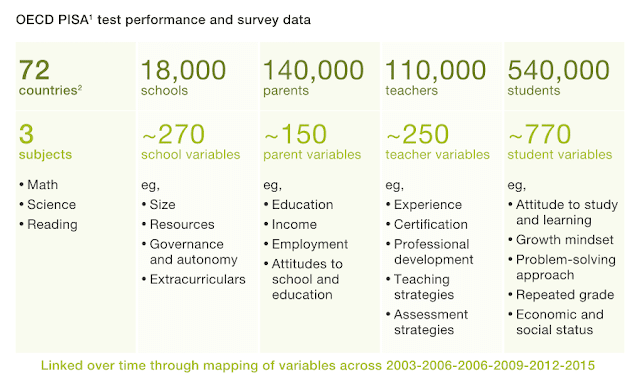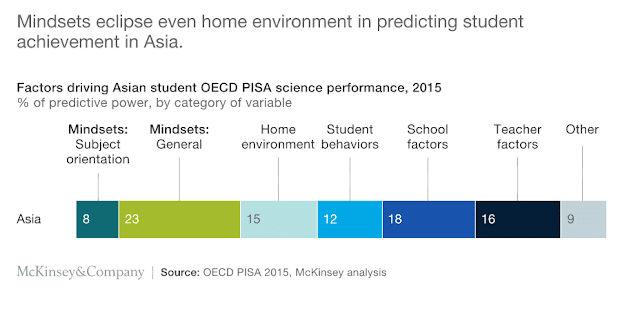How the world’s best-performing school systems come out on top and How the world’s most improved school systems keep getting better are two hugely influential reports from pre-eminent management consultants McKinsey & Company. Aimed at policy makers and politicians, the two reports address structures and systems that support excellent education.
Their latest research turns to individual student matters, and as you can see from the table, examines a large and rich data set. It is derived from the relatively narrow measure of excellence as PISA-measured academic attainment, but I think the findings are more widely applicable. The headline is that student mindsets have double the effect of socioeconomic background on outcomes (8% and 23% together, compared with 15% in the diagram below). Given the robustly-established and massive role that socio-economic factors play, it’s worth stopping for a moment to ponder this astonishing finding; that a ‘correct’ internal orientation towards learning is the most significant predictor of success. Writing from my current Singaporean context, it suggests that switching from maths tuition to mindset tuition would probably work wonders!
That last comment was not a joke, because very often the whole tuition approach can actively undermine academic attainment. Providing as it does the illusion of an (expensive) quick solution to academic challenges, it can generate precisely the wrong mindset (see here for why tuition may actually be bad for children’s attainment) and so cause lasting damage to students.

So what is the right mindset? McKinsey note ….being able to identify what motivation looks like in day-to-day life, including “working on tasks until everything is perfect” and “doing more than expected”, has four times the impact of [just] “wanting to be the best” or “wanting to get top grades”. In other words, this aligns incredibly closely with popular notions of growth mindset. I believe in this more strongly than I can convey; my students and my own children roll their eyes a little (affectionately I hope) when I talk about it because they have heard me mention it so often. It was the topic of my first student address, and the topic of my very first blog post, many years ago when I arrived at the (then new) East Campus.
The notion ‘Growth Mindset’ is easy to ridicule – and it breaks my heart to hear educators and parents dismiss it as fairytale if you believe in yourself, you can do anything stuff. It’s not a magic solution, but I am delighted to see that McKinsey have come up with further hard evidence that it matters: to be clear, mindsets alone cannot overcome economic and social barriers, and researchers still debate the extent to which… interventions can shift student mindsets…. Our research does, however, suggest that they matter—a lot….Considering its importance, local experimentation should be a priority.
We are engaged in just such experimentation, as we know that there are specific researched and robust ways we can convey mindset. And we know it make a difference – here is a powerful, moving account from a student of just what a difference a growth mindset can make; how it has transformed this student’s whole approach for the better. Any parent whose children have such mindsets can no doubt provide equally telling anecdotes.
It is also helpful to place growth mindset ideas in a broader context that will surely resonate with anyone who works in an organisation. Lou Gerstner, ex-IBM CEO out it like this: Culture isn’t just one aspect of the game. It is the game. Statesman Colin Powell put it more powerfully: Perpetual optimism is a force multiplier. … I am talking about a gung ho attitude that says ‘we can change things here, we can achieve awesome goals, we can be the best.’ Spare me the grim litany of the ‘realist’; give me the unrealistic aspirations of the optimist any day.
When different thinkers converge on the same idea, from wildly different contexts, you can be sure there is something in it.




